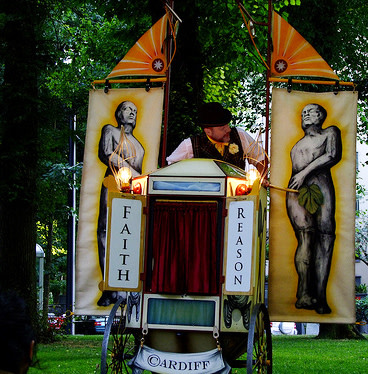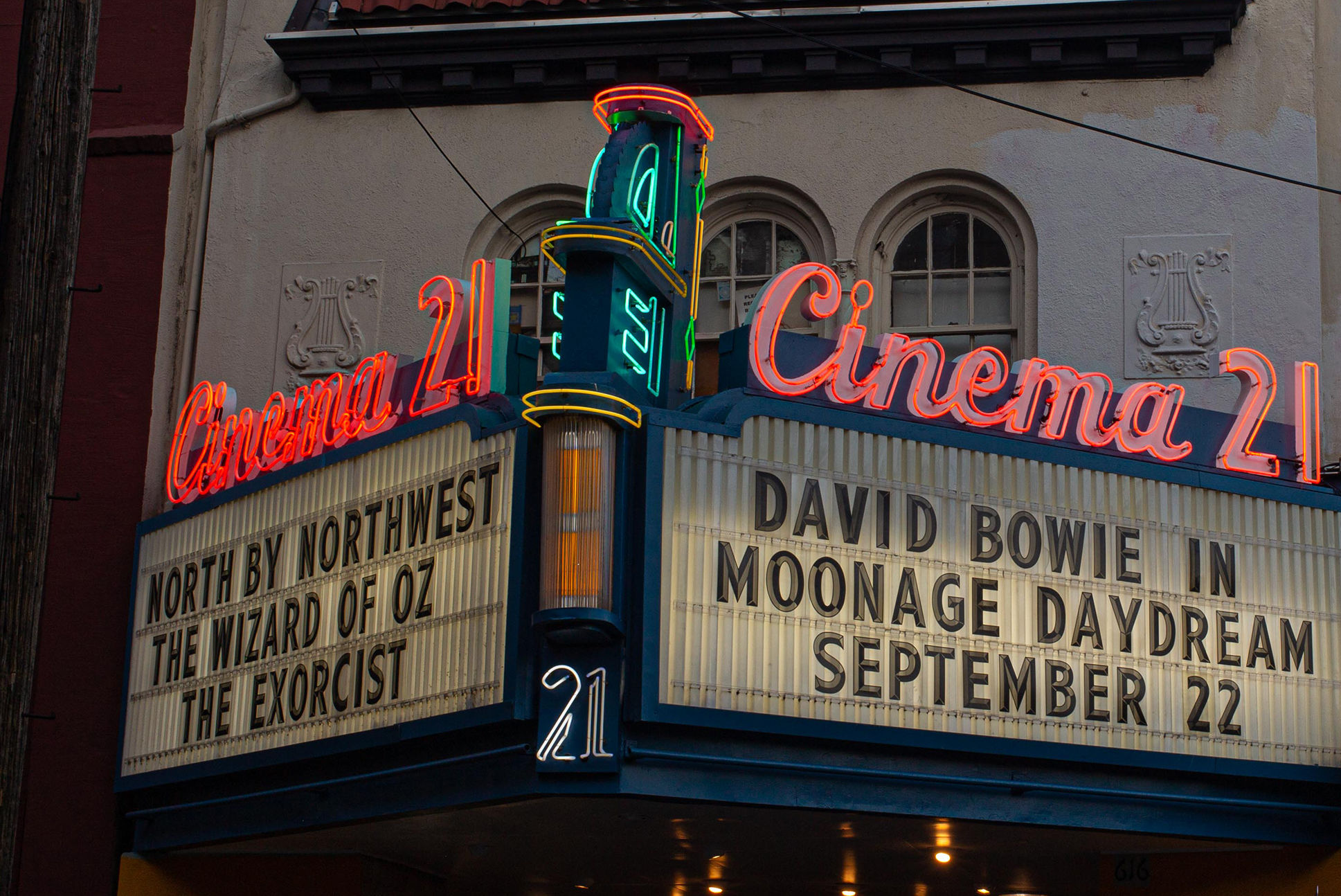TBA 2011: ©ardiff

Pay no attention to the man behind the curtain.
From the get-go, David Eckard’s demeanor was more “Okey dokey” than “Step right up!”
He’d gotten a late start setting up his mobile podium, so all eyes were already following his every move as he unfurled banners, popped panels, and generally transformed what had looked like a rolling refrigerator into a beguiling little circus spectacle. Each revelation begged him to eye the audience, to flourish and mime—but he didn’t. The performance hadn’t “started,” so instead he deadpanned, evaded eyes, and tried to act as his own roadie. Hence the desired “Ladies and gentlemen,” turned into an unspoken “Just a moment, folks,” already weakening the command his character could have taken. In other words, if this medicine man had rolled into my town square, he’d have already given us pause to mistrust him.
“Cut the guy a break,” you may say. And we did. But the patience of an arts festival audience isn’t something a carnival barker can bank on—as Eckard would soon learn.
Finally getting into character, Eckard dipped behind a banner and dramatically tipped back a bottle of brown liquid, inspiring a few laughs. Straightening his natty plaid suit and his rakish bowler, he took to his podium. A little too quietly and with a few discrediting hitches and stammers, he began reciting an ornately verbose introduction. “He’s not being big enough,” I scribbled in my notebook, then tuned back in. Having dispensed his intro, Eckard launched into a story that seemed to be about a sleeping giant. This was too great a temptation for Fate to forebear.
I should mention that a few of us were already aware of a real “sleeping giant” in our midst: a man who had been passed out drunk on the grass throughout Eckard’s aforementioned machinations. Four or five minutes into the speech, this man awoke with a start. “All you gotta-do…is just STAND in a woodenBOX and start talking, and people gather?” marveled the waking wonderer. Eckard ignored him, nattering his next lines: “…borne, by chance…”
“I was born by CHANCE!” chimed the drunk.
“…to upstate New York…”
“Upstate New York? You’re a long WAY from THERE! If I hadta pay to hear this, I tellya whut: I’d want my MONEY back.”
Though the drunk man was beating Eckard at the loudness game by half, both forged forward. Several in the crowd cleared their throats, or shifted onto their other buttock, but no one yet addressed the awakened threat.
After several more shouted retorts, acknowledgment became unavoidable. “Did JUDAS go to heaven?” heckled the drunk. Eckard’s eye brightened. “That’ll be chapter seven, Sir,” he replied before returning to his script, which offered up this uncanny next line:
“Who is he, and how did he end up here?” Seizing the moment, Eckard leveled these word directly at his challenger.
A slight woman in a beige dress steeled her nerves, got up, and approached the man, who was now standing. “Come over here,” she murmured sweetly, moving to the outskirts of the crowd. When he stood firm and loudly refused, she looked stunned, as though she had spent her entire life up to this moment luring any person to any place, simply by asking nicely.
“You’re spoiling the show for everyone!” shouted a plucky Englishwoman.
“Why?” screamed the drunk. “Why can he talk and I can’t?”
“He’s performing,” said several.
“I’m PERFORMING!” yelled the drunk (in all fairness, making a bloody good point).
A middle-aged, fit man in a pumpkin-colored polo shirt got up and squared his broad shoulders at the stranger, saying something inaudible.
“You’re in the MOOD for a FIGHT? Is that what you just said?” the drunk outed him, and—caught—he nodded. “Hit me. Hit me right here in front of all these people!”
Polo Shirt changed tactics: “You like your hat?” he asked (insinuating he might take it).
“It belonged to my brother David,” said the drunk.
Now Polo Shirt launched the lowest blow, which spun the drunk into a whirlwind of incomprehensible preaching and yelling that didn’t abate til the rent-a-cops came. “Is your brother dead?” he intoned—not compassionately, but coolly. Challenging, smooth, and smug, he seemed to imply: Vagrants like you happen on hard times. Some of them die. Ha. The well-heeled for the win.
As you might imagine, the presentation called ©ardiff had long since drifted into insignificance. Despite trying to tune back in, it couldn’t be farther from anyone’s mind. The new questions were plentiful and pressing:
What qualifies as “performance?”
Whence our entitlement to curate our own “entertainment” in a public space?
How comfortable have “performance artists” gotten, and how far have they drifted from comedians, musicians, orators, mimes—and, yes, carnival barkers —all of whom are used to having to fight for the floor?
How many minutes of provocation can you as a private citizen withstand, before you show your ugliest side?
Now, don’t get me wrong: This drunk was no hero. He was a worn-down, uncouth specimen, and he was, in legal parlance, “disturbing the peace.” But like a hurricane, he blew through and toppled a structure that had already evidently been unsound.
What’s next for Eckard, who was quick to remind the crowd that he’d scheduled several more performances? We have some suggestions for weatherproofing:
For a start, pour some real booze in that brown bottle and offer an honest swig to would-be interrupters. (Liquor control can’t have been that strict in the 1860’s—and if you’d thought of it this time, you’d have made an instant friend.) And be louder. If you have to, yell through the bell of an old gramophone. Next, know that any salesman worth his snake-oil is “on” the moment he rolls up—and use the time it takes to set up your bells and whistles, to also build suspense and crowd rapport (Perhaps take a private lesson or two from Vockah Redu ). And most importantly, be prepared to dart swiftly off of your script to slash detractors with your rapier wit. This is a life-or-death racket you’re running. Toughen up so the next town drunk won’t see you tarred and feathered.
Meanwhile, fellow onlookers, we’d be remiss to dismiss this performance as “ruined.” It offered as much spontaneity, philosophy, politics and pith as anything we’re likely to see at this year’s TBA.
For more about Portland arts events, visit PoMo’s Arts & Entertainment Calendar, stream content with an RSS feed, or sign up for our weekly On The Town Newsletter!




